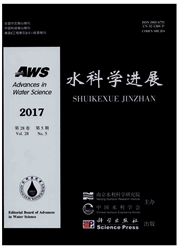

 中文摘要:
中文摘要:
传统的水库调度以兴利调度和除害调度为主,而水库生态调度则是为了实现人类需要的生态环境目标而进行的水库调度,相关的生态目标涉及水质、泥沙、生态系统和防治血吸虫病等。以水电站年发电量最大为优化目标,以生态方案为约束,提出了基于生态流量过程线的水库优化调度模型。利用该模型对黄河流域某子流域进行了水库生态调度计算,提出了4项生态环境目标,组合出5个生态方案。优化计算结果表明,与不考虑生态目标的方案相比,满足4项生态目标的水库调度方案的年发电量仅减少7.6%,可以看出如果采取合理的调度方案实现生态环境目标不会对水库的经济效益产生大的影响。
 英文摘要:
英文摘要:
Traditional reservoir operation is mainly designed for water supply and/or flood control, and the purpose of the ecological reservoir reoperation is to achieve the ecological and environmental objectives: water quality, ecosystem, sediment and disease control etc. We propose an ecological reservoir reoperation model based-on ecological flow regime. The model takes the maximum of reservoir benefit, such as annual power generation as the objective subject of the ecological scenarios. The ecological reservoir reoperation model is applied in a tributary in the Yellow River basin as an example. Based on the status quo of the watershed, four ecological and environmental objectives are given and five ecological scenarios are proposed. The results of the model indicate that the annual power generation only decreases by 7.6% with all the four objectives met than the non-ecological objective. According to the results, the hydropower benefit of the reservoir will not decrease dramatically while the ecological demand can be met, ff we introduce a suitable reoperation pattern.
 同期刊论文项目
同期刊论文项目
 同项目期刊论文
同项目期刊论文
 期刊信息
期刊信息
